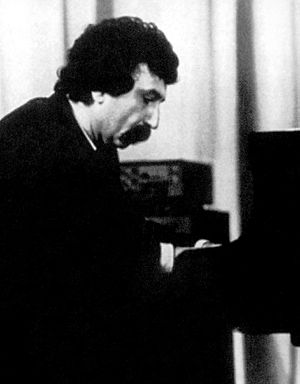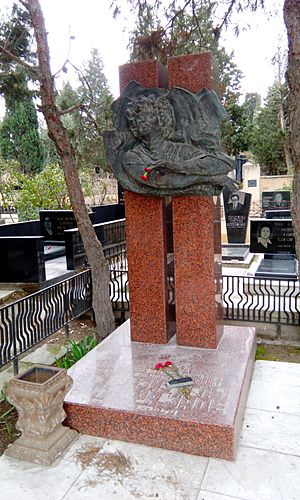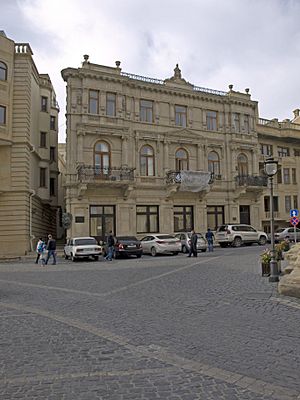Vagif Mustafazadeh facts for kids
Quick facts for kids
Vagif Mustafazadeh
Vaqif Mustafazadə |
|
|---|---|
 |
|
| Background information | |
| Born | March 16, 1940 Baku, USSR |
| Died | December 16, 1979 (aged 39) Tashkent, Uzbekistan SSR |
| Genres | Jazz |
| Occupation(s) | Composer, musician |
| Instruments | Piano |
| Years active | 13 years |
Vagif Mustafazadeh (born March 16, 1940 – died December 16, 1979) was a famous Azerbaijani jazz pianist and composer. He was known for mixing jazz music with traditional Azerbaijani folk music called mugham. Many famous jazz musicians say that Mustafazadeh was a pioneer and the "architect of jazz in Azerbaijan."
Contents
Early Life and Music Journey
Vagif Mustafazadeh was born in the Old City of Baku on March 16, 1940. A famous poet, Samad Vurgun, chose his name. Vagif's mother was a piano teacher, and she greatly helped him become successful.
In 1963, he finished the Baku State Musical School. A year later, he joined the Azerbaijan State Conservatoire. He first became known by playing concerts at his music school. Soon, he was performing at university parties and clubs. He quickly became one of the most important musicians in Azerbaijan. At these clubs, he mostly played classical jazz, along with blues and dance music.
Jazz Music in the Soviet Union
During the 1940s and 1950s, playing jazz music was not allowed in the USSR, which included Azerbaijan. It was hard to get jazz records. So, Vagif Mustafazadeh learned jazz by listening to it in movies and on BBC radio. He also sang Meykhana, a type of rhythmic poetry that was also banned. After hearing jazz on the radio, he and his friend Vagif Samadoglu tried to play the music on the piano.
Becoming Famous
From the 1960s, the rules against jazz music slowly changed. This made the late 1960s and 70s a great time for jazz in Baku. Vagif Mustafazadeh became more and more popular. His name was often mentioned among other jazz musicians. He played at music festivals in his home country and in other Soviet countries. His music grew, and he appeared in many festivals.
In 1966, Willis Conover, who hosted the "Jazz Time" radio show, called Vagif an amazing pianist. He said, "It is impossible to find anyone equal to him. He is the most lyrical pianist I have ever known."
In 1965, Vagif left the conservatoire. He went to Tbilisi to lead a music group called "Orero." Later, he started the "Qafqaz" jazz trio. In the early 1970s, he formed the "Leyli" women's quartet and the "Sevil" vocal-instrumental group. He led these groups until 1977. From 1977 until his death in 1979, he led the "Mugham" instrumental group, which he also started.
Vagif won awards at many jazz festivals. He was a winner at the "Tallinn-66" All-Soviet Union Jazz Festival and the "Caz-69" Azerbaijani jazz festivals. He also won at the Donetsk All-Soviet Union Jazz Festival in 1977. In 1978, he was named the best pianist at the "Tbilisi-78" festival. He won first prize at the 8th International Competition of Jazz Composers in Monaco for his song "Waiting for Aziza." He received a white grand piano as a prize. Vagif Mustafazadeh was given the title of Honored Artist of Azerbaijan SSR. After he passed away, he was honored with an Azerbaijani State Prize.
Jazz Mugham: A New Style
Mustafazadeh created the Azerbaijani jazz mugham style. This new music style appeared in Baku in the late 1960s and 1970s. It was a mix of jazz and mugham. Vagif looked for new ways to create his music by exploring modal music. His new ideas greatly influenced how this style developed.
His Passing
Vagif Mustafazadeh died from a heart attack after a concert in Tashkent. This happened shortly before his wife's birthday (December 17) and his daughter's birthday (December 19).

Family Life
Vagif Mustafazadeh was married twice. From his first marriage, he had a daughter named Lala. She is a talented classical pianist. In 1991, she won a big prize at the Epinal Piano Competition in France. His second wife was Eliza. They had a daughter named Aziza Mustafa Zadeh, who also became a jazz musician.
His Lasting Impact
Many famous musicians, like Willis Conover and B.B. King, praised Vagif's music. Once, when B.B. King played on the same stage as Vagif, he heard him play the blues piano. King said that no one could play the blues like Vagif. He told Vagif, "People call me the king of the blues, but if I could play the piano like you do, I would call myself God."
Even more than thirty years after Vagif Mustafazadeh's death, many of his recordings are now easier to find in stores.
House Museum
A museum was created to honor Vagif Mustafazadeh. It was started by Polad Bulbuloglu, who was the Minister of Culture. At first, Vagif's mother, Zivar khanum, ran the museum. Later, she passed it on to her niece, Afag. Afag Aliyeva has been in charge of the museum since 1997. In 2004, she helped restore the museum's displays and the building itself. Since 2004, the museum has been a state museum, managed by the Ministry of Culture of Azerbaijan.
See also
 In Spanish: Vagif Mustafazade para niños
In Spanish: Vagif Mustafazade para niños
 | Percy Lavon Julian |
 | Katherine Johnson |
 | George Washington Carver |
 | Annie Easley |


